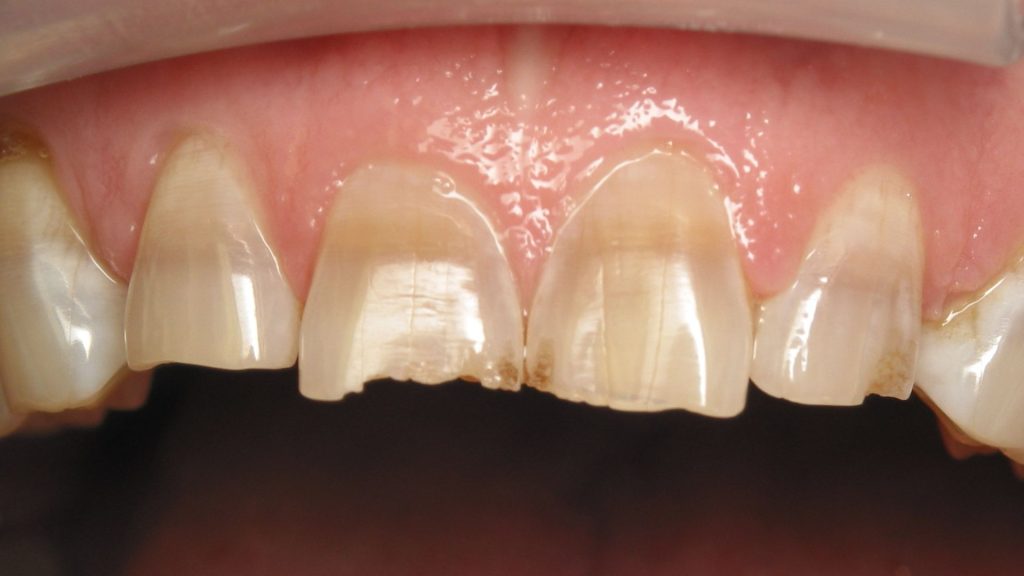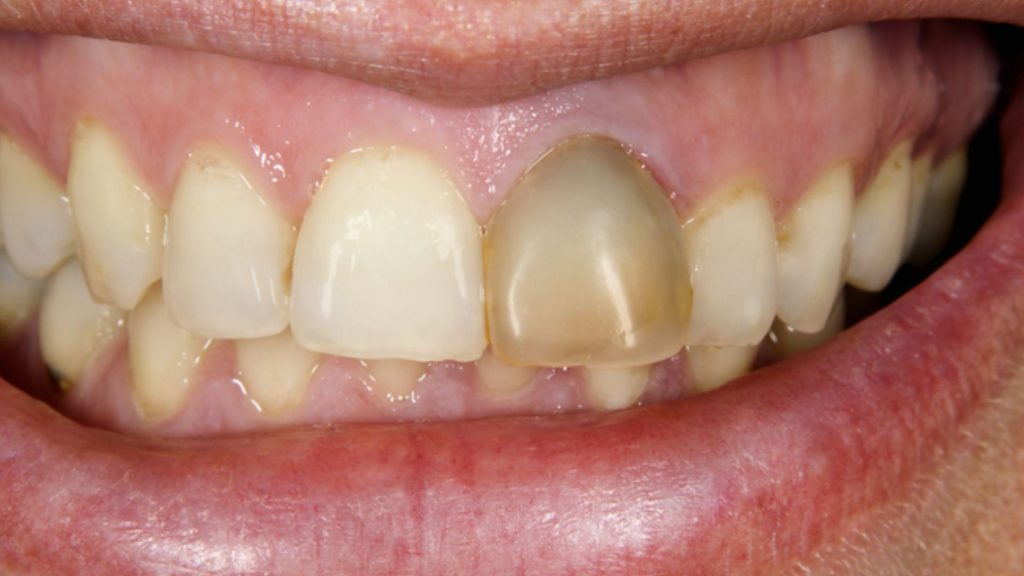Black stains on teeth are a common problem in dentistry, affecting both the appearance and health of the teeth. A lot of people are embarrassed to smile because of the discoloration of their teeth. Black stains on teeth may be both a cause and a symptom of tooth decay and other dental problems. Knowing what causes black spots on teeth and how to treat them is essential for maintaining good oral health and a beautiful smile.
Dentist Spring Orchid will explain the origins of tooth discoloration and the solutions available to you in this post.
What Are Black Stains On Teeth?

Black stains on teeth are a kind of tooth discoloration caused by the breakdown of organic and mineral components on the tooth’s surface, and they manifest as a roughness, ranging in color from gray to black, on the tooth’s surface. A man’s front, rear, or side teeth might develop black spots.
Our teeth have grown porous and less firm as a natural result of aging. Men’s teeth may get discolored anywhere on their dental surfaces, including the front, back, and sides.
What Causes Black Spots On Teeth?
Because of a dark spot on your teeth, you’ve undoubtedly felt self-conscious while speaking or smiling. That’s terrible. But, even if you take excellent care of your teeth, black stains will grow on them at some time. Trauma, sickness, bad behaviors such as smoking, drinking coffee or alcohol, or a poor diet may all cause black stains on teeth.
Don’t worry, let’s talk with a Bassendean dentist to understand the origin of black stains on teeth and discover the correct therapy to keep your teeth healthy and beautiful.
Tooth decay-blackened teeth

Black patches on teeth indicate mineral loss and tooth enamel breakdown, commonly caused by dental decay. Teeth become more vulnerable to plaque and bacteria accumulation when decay spreads further inside the tooth, damaging the enamel coating. Plaques form on teeth when bacteria and food particles combine to form a sticky film that then stains teeth a dark color. Without treatment, dental decay may grow into the tooth’s inner tissues, causing discomfort, infection, and tooth loss.
Hence, you should keep up with a good oral hygiene routine, which includes brushing twice a day, flossing, and scheduling routine dental visits, to prevent black stains brought on by tooth decay.
Teeth build plaque over time

Long-term plaque collection on teeth forms a thick coating of bacteria, proteins, dead cells, and other organic particles termed dental plaque (also known as dental plaque). Dental plaque is a microbe that thrives in a wet environment, has adequate nutrients, and gives bacteria and other germs a habitat to live and flourish.
If not eliminated, dental plaque may create foul breath, discolor and tarnish teeth, induce tooth decay and periodontitis, harm the tooth pulp, impair tooth enamel durability, and cause tooth loss and overall bodily health.
Antibiotic-stained teeth

Darkened areas on the tooth’s surface, brought on by the antibiotic’s active ingredients, characterize the antibiotic-induced black spot, a dental anomaly. Children who use antibiotics may have delayed tooth development and structural changes that make their teeth more vulnerable to bacterial invasion and loss of shine, both of which may lead to permanent black patches on the teeth.
Tetracyclines, doxycyclines, and minocycline are common antibiotics that may have this effect. Antibiotic usage during the tooth-forming process is a common cause of this (birth to age 8).
But, parents must be aware of antibiotics’ effects on children’s teeth and see a dentist to prevent and remove black stains.
Smokers consume colorful foods
It’s possible to get stained teeth by smoking or eating meals with strong colors. Tobacco’s chemical ingredients seep into tooth enamel, causing its degeneration and discoloration, which ultimately results in black teeth for smokers. Stains of yellow or black may be caused by the chemicals found in colored meals and beverages, such as coffee, tea, carbonated soft drinks, coconut milk, and red wine. Loss of enamel from the foregoing factors may also lead to sensitivity and vulnerability of teeth.
Avoiding risky behaviors like smoking and eating lots of brightly colored foods, and using fluoride toothpaste on a regular basis, may assist.
Genetically darkened teeth
Tooth discoloration may be inherited, and both inadequate and absent enamel might contribute to this problem.
The enamel-deficient tooth surface will have several patches of varying sizes, providing ideal conditions for bacterial colonization. Spots operate as entry points for germs to damage the remaining enamel layer, leading to the development of black streaks.
Black Tooth Stains Harmful

Black spots on teeth may be a cosmetic problem, but they can also indicate the presence of bacteria that, if left unchecked, can lead to more significant oral health issues including gingivitis, periodontitis, receding gums, bone loss, and even irreversible tooth loss if not treated.
Cosmetic Tooth Loss

When the black spots appear around the incisors, the other individual is usually able to immediately identify the affected person.
Thus, those who have dark stains on their teeth may be reluctant to smile or strike up conversations with others. However many individuals suffer from poor self-esteem, which has negative effects on their mental health and makes them anxious and depressed.
Causes Bad Breath
Black stains on teeth are a favorable environment for bacteria to exist and grow, including many anaerobic bacteria. These bacteria are the leading cause of bad breath.
Patients will always feel bad breath despite regular oral hygiene. Bad breath will reduce the quality of life, affect surrounding relationships, and even be shunned.
Periodontitis And Gingivitis
Plaque-forming bacteria in tartar are the root cause of gum disease and inflammation. As the patient was only experiencing modest discomfort initially, the therapists’ efforts were directed more toward alleviating the symptoms than investigating and treating the underlying causes.
An increase in gingivitis and periodontitis has been related to black stains on teeth.
Recession, Tooth Loss
Black tartar firmly adheres to the roots of the teeth, breaking the connection between the teeth and gums, and the gums gradually recede. When the gums recede, the roots of the teeth and jawbone are exposed, creating an opportunity for bacteria to attack inside.
Patients are at risk of permanent tooth loss if not treated promptly.
Common Tooth Black Stains
Black spots on teeth may form in any location, but the front teeth, molars, and wisdom teeth are where they most often appear.
Black Front Teeth

This kind of staining is the most typical and obvious kind of tooth discoloration. Black patches on the bottom front teeth, particularly in the spaces between the teeth and the gums, are readily seen by patients.
Plaque builds up mainly because, over the course of one’s regular dental hygiene routine, the back of one’s teeth and the spaces between one’s teeth are frequently neglected.
Black Molar Spots

Teeth stains are most common on molars 6 and 7, the jaw’s two most important chewing teeth. Crap may easily become stuck in the crevices and gaps between your teeth.
Moreover, teeth are positioned deep inside, making them difficult to clean; food collects to form tartar plaques, which are black stains that are particularly tough to remove.
Wisdom Teeth
Unlike the other molars in your mouth, your wisdom teeth are not meant to help you chew your food. Due to the shifting of the jaw, wisdom teeth sometimes emerge crooked, increasing the likelihood of food being lodged between the teeth.
As a result, patients often have black stains on their wisdom teeth, but only when the doctor utilizes specialist instruments to inspect the dental ear can this issue be identified.
Spring Orchid Clinic’s Black Stain Treatment

With the right dental care, you might be able to get rid of all black stains on your teeth, but that depends on what caused them in the first place. Your dentist may use polishing, whitening, and porcelain veneers, among other things, to get rid of stains caused by plaque buildup, smoking, and bad eating habits.
Nevertheless, substantial decay or damage in the dark zone will need treatment to remove the rot and restore the damage:
- Teeth whitening: A method that uses chemicals or light to remove plaque on the teeth that causes dark spots. This method is often used for dark spots caused by smoking, eating or aging teeth.
- Orthodontic treatment: A method of treating black marks caused by trauma, cracks or discoloration on the tooth surface. This method uses fillings or crowns to correct the problem.
- Treating tooth decay: Black stains on teeth can be caused by cavities. This method uses crowns, fillings or teeth whitening to treat this condition.
- Braces: For cases of uneven teeth, braces can help treat dark spots and create a beautiful natural smile for the patient.
- Dental suture: This method is often used for severe tooth trauma, but this method is only suitable for black stains on the tooth surface and is not applicable for endogenous black stains of teeth.
Each method has its own advantages and limitations, Spring Orchid dental clinic will advise on the most suitable treatment method for each patient’s specific case to achieve the best effect.
Conclude
Our Bassendean dentists are happy to take care of your oral health. With the QIP standard, you can be completely assured of the quality of our services. We always strive to give our customers the best possible experience with a team of professionally trained dentists.
- We also provide teeth whitening services with modern technology, helping customers get whiter and fresher’s teeth. In addition, the clinic is fully equipped with amenities to help you feel most comfortable while waiting for your examination.
- Our dentist Ylan Pham is a professional with over 10 years of experience in the dental industry. She will dedicatedly guide you on how to take care of your teeth and help you have a brighter and more confident smile. With her talent and experience, she always puts service quality and customer satisfaction first.
FAQs
Can I home-treat black tooth stains?
A trip to the dentist is in order if you’ve noticed any kind of black staining on your teeth. Avoid treating your teeth and gums on your own, since this may lead to injury and infection. Whitening products for teeth, which are not subject to rigorous regulation, may also include substances that are detrimental to teeth.
In light of this, it is highly recommended that you see a dentist for assistance.
How to avoid black tooth stains after treatment?
Keeping your teeth from becoming discolored again after bleaching is possible by doing the following:
- Good dental hygiene is the single most essential factor in avoiding the growth of brown spots on teeth. Use fluoride toothpaste and dental floss at least twice a day.
- Keep your mouth moist: Drinking adequate water reduces the number of bacteria in your mouth, making it less likely that your teeth will become yellow. Drinking water and eating sugarless gum may aid saliva production.
- Minimize your consumption of dark-colored beverages such as coffee, red wine, soft drinks, black tea, and cigarettes. These drinks and substances foster the growth of germs and leave persistent stains on your teeth. You should limit your consumption of certain beverages to minimize tooth discoloration.
- Routine Dental Visits: It is important to maintain the health of your teeth by seeing the dentist at least twice a year. Your dentist will assist you in checking your dental health and whitening your teeth to eliminate any leftover dark stains.
Furthermore, it is crucial to take measures to prevent discoloration from returning after treatment if you care about the health and beauty of your teeth. If you want to prevent future tooth discoloration, follow these steps.





